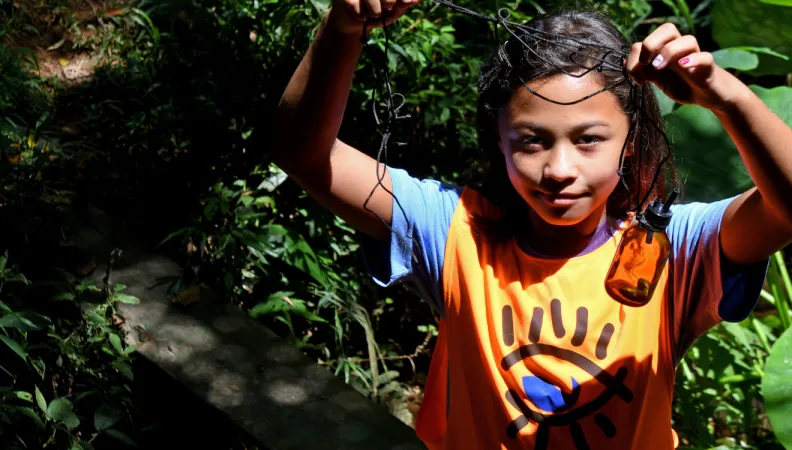Share the page
International Day of Education: Integrating the Environment into Education
Published on

This year’s International Day of Education on January 24th highlights the urgent need for greater awareness of climate change, and the role that schools can play in tackling environmental issues.
Due to more than a century of population growth and industrial activity, climate change and environmental disruption are emerging as the world’s foremost challenges. Generally, the younger generations view climate change as a global emergency and the Covid-19 crisis has only served to deepen their resolve. However, their eagerness for mobility and consumption may ultimately land them in the crosshairs of an anxiety-inducing paradox, where fears of an apocalypse produce resignation and inaction.
Starting from the primary level however, schools are increasingly becoming a pivotal space for getting to grips with these issues. Educating young people enhances their understanding of the interdependence between humankind and the planet, thereby helping them learn to adapt to and mitigate environmental disruptions, and comprehend the transformation of jobs that can be endangered by global warming. As such, projects highlighting the correlation between education and environmental conservation are proving to be critical.
The fourth International Day of Education is an opportunity to explore the pivotal role of the education sector in driving the green transition agenda. The theme retained for this year is: “Changing Course, Transforming Education,” a theme that fits seamlessly into AFD’s activities.
The need for adaptation
Bertrand Foucault is project manager of the Education Division and a climate awareness focal point at AFD. “With climate change, some jobs will be transformed, new ones created, while others will simply die out,” he says. “Indeed, breeders will no longer work in their area of expertise as before due to drought, for instance, while the job of the miner who digs coal is endangered.”
These transformations will engender new skills however, in fields such as energy, transport, logistics or agriculture. “This is why AFD is supporting vocational training programmes in order to promote sectors undergoing transformation by targeting vulnerable populations that are often the hardest hit of all,” adds Bertrand Foucault. For instance, AFD is supporting training centers in Central Africa to develop training in sustainable forest management."
Against this backdrop, raising awareness of environmental issues among young people is critical. “A country that does not invest in acquiring basic knowledge will not allow its people to adapt and play a role in dealing with climate change through responsible behavior,” stresses Bertrand Foucault. With growing urbanization in most countries worldwide, individuals, and especially young people, tend to disconnect themselves from nature. Repositioning the environment as a core priority and activity is an absolute necessity.
Since 2021, AFD is using the Adapt'Action Facility to support the integration of climate-related issues, particularly adaptation to climate change, into Senegal’s education system (middle and high schools, universities and vocational training). This is a means of giving the younger generations the keys to resilience.
Building knowledge spaces and preparing young people
Today, there is an overwhelming need for educational infrastructure. Accordingly, AFD is committed to financing construction and equipment with low environmental impact, from the primary to the higher education levels. “Nearly 70% of education financing is earmarked for renovating and building facilities for young people,” notes Bertrand Foucault. The programs are tailored to local contexts: direction of buildings according to the wind, insulation from high temperatures, use of local materials, etc.
In the Comoros, a project to upgrade the school environment is helping to rehabilitate and extend roughly 45 schools on the three islands, bearing in mind the impact of climate change. This is all the more important as the region is heavily exposed to climatic and geological hazards, such as cyclones. Additionally, the school infrastructure is often in a state of disrepair.
A guide entitled “Building sustainable schools and colleges in the Comoros” will be released to encourage stakeholders to pursue a project that not only enhances safety, comfort and health, but also stimulates the intellect. Since 2021, AFD is financing this four-year project with a grant of €20 million.
To find out more: Educational kit “Understanding climate and development issues better”
The issue is the same at university level. “The carbon footprint of a university is primarily tied to the emissions activities tied to the building and to student mobility," says Bertrand Foucault. Adding that: “Going forward, right from the construction phase, consideration is given to students’ modes of transport and how waste is managed. We also support the development of environmental risk governance in institutions.”
It’s a vision of education aligned with the Paris Agreement – particularly Article 12 on climate change education – and with the commitments made during the recent COP26 summit in Glasgow.
